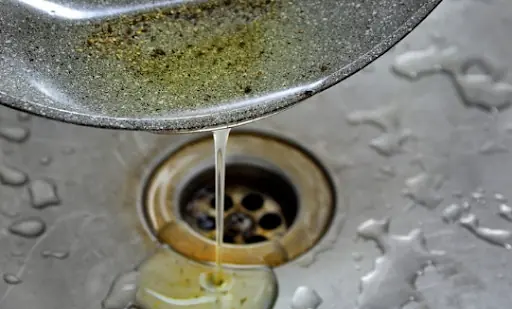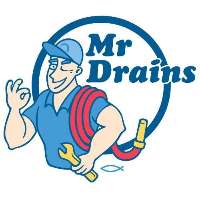You’ve just enjoyed an amazing home-cooked meal: the perfect Chicken Schnitzel and chips, with a healthy side salad and a nice cold beer. Now you have to attack the dishes. But what to do with the cooking oil from frying up the chips and chicken… Easy – just pour it down the sink, done.
STOP – Please don’t do it!

Pouring leftover cooking grease or oil down your kitchen sink might seem harmless, but this seemingly innocent act can lead to significant plumbing problems. Not only does it affect your home, but it also contributes to environmental issues. Let’s explore the dangers of this practice and discover better ways to dispose of these substances.
The Grease and Oil Menace
When in liquid form, grease and oil might seem harmless, but as they cool, they solidify and stick to the inside of your pipes. Over time, this build-up creates a sticky, gloopy substance often referred to as a “fatberg”. This can significantly reduce water flow, leading to slow drains, gurgling sounds, and, eventually, complete blockages.
FATBERG – A fatberg is a rock-like mass of waste matter in a sewer system or home plumbing formed by the combination of flushed non-biodegradable solids with fat, oil, and grease deposits. The handling of FOG waste and the buildup of its deposits are a long-standing problem in waste management, with “fatberg” a more recent neologism.
Wikipedia

Beyond your home, these fatbergs can cause even more significant problems. They contribute to blockages in the wider sewer system, leading to overflows and environmental contamination. Imagine the cost and disruption caused by clearing these massive blockages!
Alternatives to Pouring Grease Down the Drain
So, what can you do with that leftover cooking oil or grease? Here are some effective alternatives:
Let it Cool and Solidify: Transfer the grease or oil to a sealed container once the grease or oil has cooled completely. Once solid, dispose of it in your general waste bin.
Use a Grease Trap: Many commercial kitchens use grease traps to collect oil and grease. While these might be overkill for home use, they can be effective if you cook heavily.
Composting: If you have a compost bin, small amounts of cooled, solidified grease can be added. However, to prevent pests from attracting to it, it’s essential to ensure it’s a well-managed compost system.
Oil Recycling: Some communities offer oil recycling programs. Check with your local council to see if this is an option in your area. If you live in Sydney, you can find a local recycling centre here.
Preventing Blockage Issues
In addition to proper disposal, there are steps you can take to prevent grease and oil build-up in your pipes:
Wipe Pans and Dishes: Before washing dishes, wipe out pans and plates with paper towels to remove excess grease.
Use a Drain Strainer: A drain strainer can catch food particles and other debris before they enter your pipes.
Regular Cleaning: Pouring hot water down your sink can help to melt away grease build-up. You can also use commercial drain cleaners, but these should be used sparingly and according to the instructions.
Following these tips can help prevent blocked drains, protect the environment, and save yourself from plumbing headaches. Remember, a little prevention goes a long way! If you are currently having any issues from previously pouring oil and grease down the sink, get in touch with the Mr Drains team on 9986 1234 to book an appointment or book online, and we can get those drains sorted.
